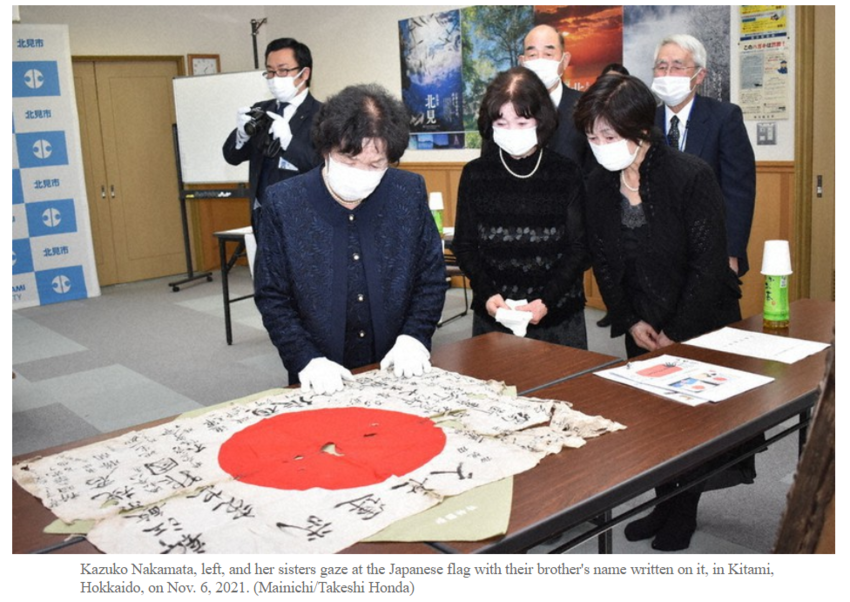Japanese Newspaper '' The Mainichi '' featured flag return in Kitami City-Hokkaido Japan
Nov
14
KITAMI, Hokkaido -- After 79 years, a Japanese flag thought to have been taken to battle by a soldier killed in the Pacific War has finally returned to his hometown, the city of Kitami in Hokkaido. Upon receiving it, his sister said through tears: "My brother has finally managed to come home."
On the flag were messages addressed to Shigenori Arae, who died in 1942 aged 23 on Guadalcanal in the Solomon Islands. Arae was the eldest son of nine siblings. His 93-year-old sister Kazuko Nakamata, who lives near the family home, said that because his remains were never returned, the flag meant her brother could finally come home.
Arae was assigned from the Imperial Army reserve officers' academy in Morioka, Iwate Prefecture, to Colonel Kiyonao Ichiki's detachment of the Imperial Japanese Army's 7th division in the Hokkaido city of Asahikawa. He was killed in combat against U.S. forces on Guadalcanal on Aug. 21, 1942, one of some 20,000 Japanese who died in the battle.
Arae was 21 when he left the Tokoro-cho neighborhood, now part of Kitami. His sister, Nakamata, then 13, recalled the day: "I went with him to Abashiri Station and saw him go. He leaned out the window and waved to me." Her big brother apparently asked her to "be good to our parents for me, too." "He was a kind brother," she said.
The flag, which has the words "presented to Shigenori Arae" written in its upper right corner, was found among the belongings of Louis Sowers, a U.S. military pilot who died in 2001. His nephew Mark Shelton was taking care of it when he learned about the movement to return Japanese flags. Shelton entrusted it to the Obon Society, an American non-profit organization. Eventually, they contacted the bereaved family association in Kitami, who took about two years to reach Arae's family including Nakamata.
The flag is quite damaged, as if telling of a fierce battle.
The inscriptions on it include "Buunchokyu (long-lasting good luck in battle)," "Fushakushinmyo (unsparing devotion to Buddhism)" and "Ganbare (do your best)." "They were probably written by his colleagues at work or at the military academy," Nakamata said.
A handover ceremony in Kitami on Nov. 6 was also attended by Arae's other siblings, Noriko Watanabe, 85, and Sanae Kudo, 80, who both live in Hokkaido. It was the first time the sisters had seen their brother's belongings in 79 years. They plan to display the flag along with his portrait in front of the Buddhist altar at the family home.
Nakamata thanked the involved parties including the Obon Society and Shelton, saying, "His remains were never returned. This is the only memento of him. I'm glad I lived long enough to see it." Obon Society staff member Kosuke Kudo, 47, said about 400 of the around 2,000 flags entrusted to it so far have been returned to bereaved families. This is the fourth case in Hokkaido, following others in Sapporo, Chitose, and Uryu.
https://mainichi.jp/english/articles/20211113/p2a/00m/0na/004000d?fbclid=IwAR3p5yrc_R1mYwPCixB9oPz_SVAe3QSmd_NK4710dj1GQYZZwv-Q8kKJjXA


